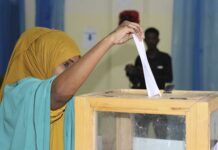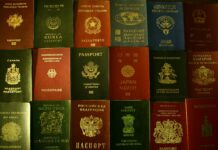Just one day before The Gambia’s president-elect, Adama Barrow is set to take over from outgoing president Yahya Jammeh, the latter has declared a state of emergency prohibiting any civil disobedience and disruption of the public order from the citizens of the country. Jammeh is refusing to step down as president despite losing the general election last month.
Al Jazeera reports that a National Assembly resolution was passed on Wednesday which will extend Jammeh’s term by three months starting on Wednesday, the day before the inauguration of Barrow was meant to be held.
Opposition leader Barrow defeated Jammeh in a surprising result in the December 2016 elections. Jammeh had been president for 22 years, when he came into power following a military coup. What was more surprising was that Jammeh called Barrow soon after the results were released to concede defeat and wish him well. He even said that it was God’s will that he had lost and that he would accept that.
However, not even a week later, Jammeh declared that he would not be stepping down and that the election had been tampered with by outside interference. So he filed a petition with the Supreme Court. He has also said that because that process was ongoing, Barrow will not be able to take over office from him. Jammeh is trying to also trying to prevent the chief justice from being able to swear Barrow in as president. However, under The Gambia’s constitution, Barrow does not need a chief justice to swear him in and can be sworn in by a commissioner of oaths.
However, the Supreme Court has told Jammeh they will be unable to hear his petition for a while because a full bench is needed. Most of the judges in The Gambia have fled the country and foreign judges take up many of the positions within the country’s courts.
Barrow himself is not in The Gambia, having sought refuge in Senegal until the inauguration. He was due to return for the inauguration, accompanied by several world leaders. However, with the extension of Jammeh’s term, it seems more likely that Thursday’s inauguration will not take place.
Members of the international community, neighbouring countries, and members of the Economic Community of West African States (Ecowas) have called on Jammeh to step down and for there to be a peaceful transition of power. Even though a military intervention has not been ruled out, leaders say they are not looking to overthrow Jammeh.
Al Jazeera journalist, Ahmed Idris, who is reporting from Abuja, Nigeria said: “Military and diplomatic sources in Abuja say they are not overthrowing Jammeh but are enforcing the mandate of Ecowas and the African Union, as well as ensuring that the choice of The Gambian people is realised at the end of Jammeh’s term. There’s been a lot of diplomatic and military activity and preparations ahead of the deadline given to Jammeh to leave office.”
Just before the state of emergency was declared, four ministers from Jammeh’s cabinet resigned: those of finance, foreign affairs, trade, and environment. The Chief Justice Emmanuel Fagbenle said he would not be able to hear the case filed by Jammeh to stop the inauguration.
With the declaration of the 90-day state of emergency, it now seems clearer than ever that Jammeh intendeds to stay in power and will not be giving up the presidency under any circumstances.
Jammeh said that he was making the order “to prevent a constitutional crisis and power vacuumâ€. He added that security forces were instructed to “maintain absolute peace, law and orderâ€.
With the extension of Jammeh’s term, the state of emergency, and Barrow not being in The Gambia, the situation is tense, with looming fear of civilians getting caught in the crossfire.









